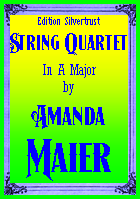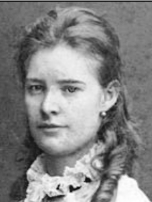Presents
Amanda Maier
 |
 |
SOUNDBITES |
String Quartet in A Major-World Premiere Edition
Amanda Maier (1853-1894) was born in the Swedish town of Landskrona. Her early musical studies on violin and piano were with her father. Subsequently, she studied at the Stockholm Conservatory, winning awards not only for her violin playing but also for her ability on the organ and cello as well as for her compositional ability. After graduating, she continued her studies at the Leipzig Conservatory where she studied composition with Carl Reinecke and violin with Engelbert Röntgen, concertmaster of the Leipzig Gewandhaus Orchestra. While in Leipzig, she composed several works, among them the String Quartet in A Major dating from 1877. After leaving Leipzig, she spent the next few years touring as a concert violinist before marrying the composer Julius Röntgen, the son of her teacher. Amanda was a fairly prolific composer up until her marriage by which time she a two piano quartets, a piano trio, two string quartets and several other instrumental works to her credit. Most of these works are still in manuscript and several, unfortunately, have been lost. After her marriage she more or less gave up her career. Brahms and Grieg were among those who heard and praised her music highly. Only a few of her compositions were ever published.
The score to her String Quartet in A Major languished in manuscript form and is now located in the Stockholm Theater and Music library. We obtained a copy of it in 2019. It is impossible to tell whether she completed the work because the first and last movements are missing some sheets of the manuscript. However, the first movement, an interesting Allegro, is all but complete except for some final measures and as such was not difficult to finish. The second movement is a lovely, highly romantic Andante, full of appealing melody. The third movement, Allegro non troppo is a cross between a scherzo and a lilting intermezzo and has a nicely contrasting trio. The manuscript to the finale, an exciting Presto, has one long section and several shorter ones, clearly meant to be connected to each other. Considerably more work had to be done to complete the movement and our senior editors, Tomasz Golinski and Raymond Silvertrust worked very hard to create a version, which stylistically follows the ideas found in the extant sections.
Because there is so much fine material in this work, we decided is was a worthwhile project to complete the quartet and believe chamber music enthusiasts will be pleased with our efforts and, of course recommend it to professionals and amateurs alike.
Parts: $34.95
Parts & Score: $44.95